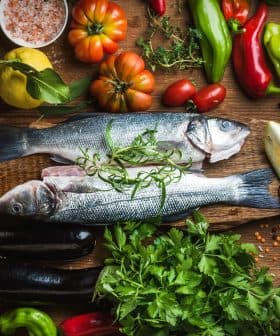Med Diet Could Relieve Pain Linked to Obesity
A diet rich in fruits, vegetables, plant-based protein and seafood can decrease the chances an overweight person will experience regular pain due to inflammation.
Researchers at Ohio State University found that following a Mediterranean-type diet, high in fruits, vegetables, plant-based proteins, and fish, could decrease the likelihood of overweight individuals experiencing regular pain. The study, published in the journal Pain, revealed that components of the Mediterranean diet, such as seafood and plant-protein, were strongly associated with lower pain levels due to their anti-inflammatory properties.
Mediterranean diet adherents the world over will find one more reason to continue including lots of fruits, vegetables, plant-based protein and fish in their diet. Ohio State University researchers have found that a Mediterranean-type diet could decrease the chances an overweight person will experience regular pain.
Our study found lower pain associated with a diet that was generally associated with reduced inflammation.
That obesity is “painful” has been attributed to the fact that a multitude of chronic conditions causing pain is more common in people who are obese and overweight.
“Prior studies have documented that obesity is associated with pain in a variety of areas including joint pain (hip and knee), headache, lower back pain, fibromyalgia, chronic widespread pain, abdominal pain, pelvic pain, and neuropathic pain,” Charles Emery, the lead researcher and a member of Ohio State’s Institute for Behavioral Medicine Research told Olive Oil Times.
In the study that appeared in the journal Pain, 98 men and women aged between 20 and 78 years were examined. First, the researchers came up with a model that could help them establish if an anti-inflammatory diet high in healthy fats, fish, plant-based proteins like nuts and beans, fruits and vegetables and whole grains (your typical Mediterranean diet) was crucial as to whether these individuals’ weight would contribute to pain.
The model took into consideration weight, an analysis of self-reported dietary patterns (the Health Eating Index, a measure of diet quality based on U.S. dietary guidelines), and results stemming from a two-question pain survey. Researchers visited each interviewee in their home and spent three hours with them, while they also considered the participants’ age, whether they suffered from depression or not, and whether they made use of analgesic medication or not, as these were deemed important factors that could interfere with the result.
Next, three different measures of weight were employed to test the model: body mass index, waist circumference, and body fat percentage. In all three measures, the study found evidence that the presence or absence of anti-inflammatory proteins may offer explanations as to why increased weight is associated with pain. It was established that the components of a Mediterranean-type diet were linked with less pain, regardless of body weight.
But what are the properties of the Mediterranean diet that render it strongly anti-inflammatory, and are there perhaps any components that are more anti-inflammatory than others?
“The anti-inflammatory effect results from a better balance of fats in the diet — for example, Omega 3 or Omega 6, which have direct effects on metabolism,” Emery said.
“Our study found lower pain associated with a diet that was generally associated with reduced inflammation, including lower amounts of refined grains, sodium, and added sugars, in addition to greater intake of fruits and vegetables.
“When we then focused on the component of that diet that was most strongly associated with lower pain, it was seafood and plant-protein, foods primarily associated with the Mediterranean diet,” said Emery.
“It is also important to keep in mind that overall dietary intake is important for reducing inflammation and pain. It would be a mistake to say that any one or two or three dietary components would be responsible for the anti-inflammatory effect and reduction in pain,” said Emery, whose next step is to study body fat and pain using biomarkers associated with inflammation.









